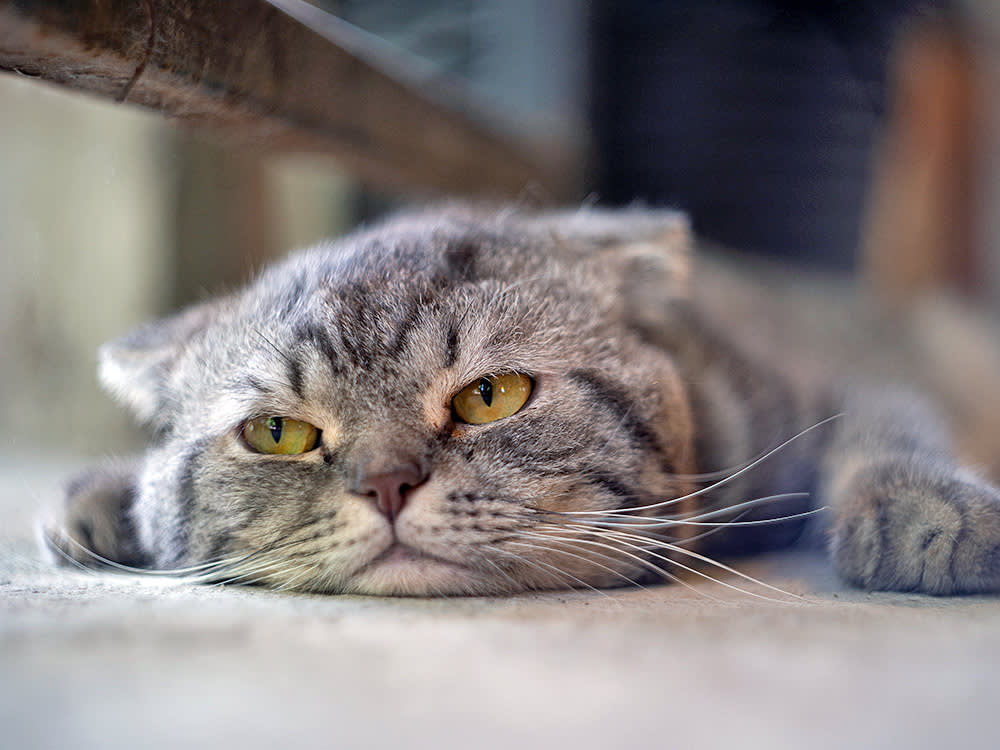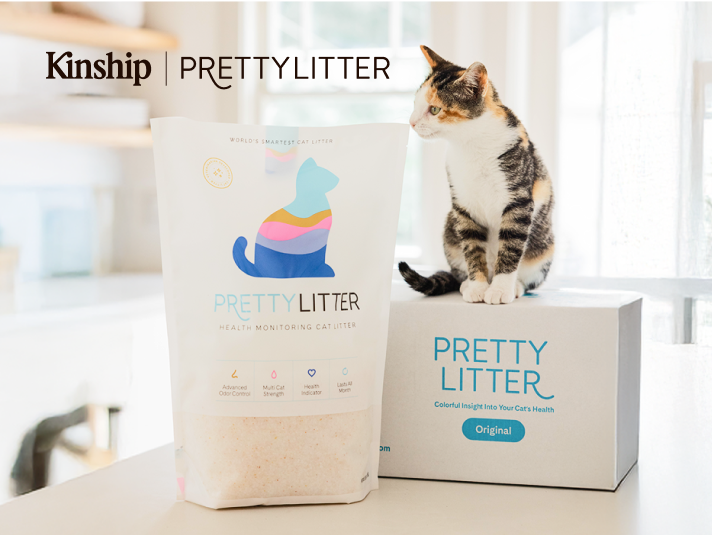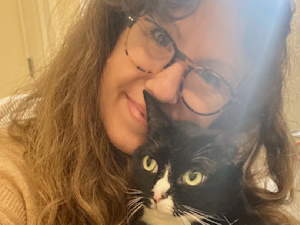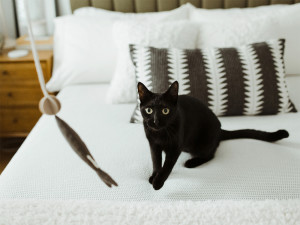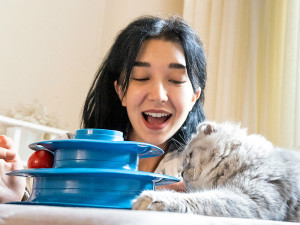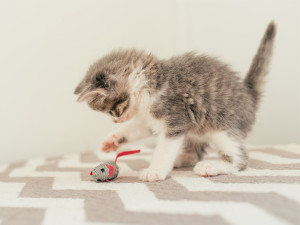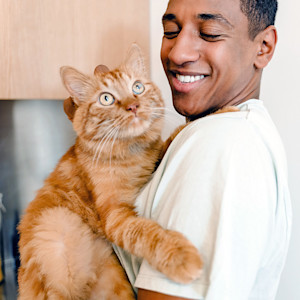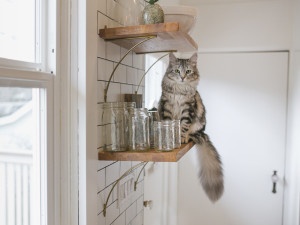What Really Happens to Your Cat When You’re Too Busy to Play With Them
For starters, get ready to clean up some messes.
One of the reasons I love being a cat momopens in new tab instead of a dog mom is that cats are (relatively) low-maintenance, compared to dogs. I never need to get out of bed early on a rainy morning to take my cat out, I don’t have to pick poop up off the sidewalk, and I don’t have to go for walksopens in new tab if I don’t want to (actually, this may be a reason to consider becoming a dog person — more walks would benefit both my mental and physical health).
After a stretch of being extra busy with work and travel, however, I’m beginning to wonder if my cats aren’t quite as low-maintenance as I thought. They’ve been hissing and fighting more often, and my oldest, Freddy, has been extra clingy when I’m home. Could it be because I’m not playing with them enough? I asked the experts to help me understand how skipping playtime affects my currently hyperactive kitties.
Save on the litter with color-changing tech that helps you better care for your cat.
It throws off their routine.
Veterinarian Dr. Nell Ostermeieropens in new tab, a spokesperson for Figo Cat Insuranceopens in new tab, tried to assuage my working cat-mom guilt. “Life gets hectic — sometimes we all literally ‘drop the ball’ on playtime,” she says. “For most cats, skipping a day or two of play won’t cause lasting harm.”
But this depends on the individual cat, she notes. “For cats who are very routine-oriented or prone to anxietyopens in new tab, even one missed day can throw them off.” Uh-oh. She lists weight gain (due to lack of exercise), boredom, and anxiety as potential consequences of missing play.
How much do you spend on your pet per year?
It causes them to act out.
Joey Lusvardi, a certified cat behavior expert at Class Act Catsopens in new tab, doesn’t mince words. “Playing is a really important behavioral need for cats. Not playing with your cat enough can result in all sorts of behavior concerns, from aggressive behaviors to ones that are more annoying, like pushing things off counters.”
This reminds me that Freddy did break my favorite vase once — and looked me right in the eyes, remorseless, as she sat in the middle of a mess of flowers, water, and broken ceramic.
“Extended periods without enrichment can lead to unwanted behaviors such as inappropriate chewing or scratching,” says veterinarian Dr. Victoria Carmella, an advisor at Pet Honestyopens in new tab, though she notes that missing a day, or even a week, may not cause issues for some cats.
It affects your relationship with them.
While Dr. Carmella agrees with Dr. Ostermeier that missing a couple of play sessions isn’t a huge deal, she reminds me that playtime isn’t just good for my cats; it strengthens our bondopens in new tab, which is good for me, too.
I do miss playing with my cats, even when I’m busy, and when I have to shoo them out of my suitcase while I’m trying to pack (they climb in there every time), my heart breaks a little bit.
But sometimes, it might not matter (depending on the cat).
Cat behaviorist Stephen Quandtopens in new tab points out that some cats simply aren’t as playful as others. “For some cats, skipping play is going to make them bored, and possibly frustrated. This could lead to acting out behaviors. But if your cat is a couch potato, then it may not make any difference at all.”
I like this answer, but while I’d like to believe that my cats are part sloth, like me, their human mother, I think this is probably not the case.
Fit playtime in whenever you can.
If, like me, you’re determined to play with your cats more and save them from anxiety, boredom, and acting out, take heart: The task might not be as daunting as you think. Lusvardi says that cats prefer shorter play sessions spread throughout the day, anyway. “If if you have a pocket of time, try sneaking in a quick session then.”
Lusvardi says consistent playtimes are better for cats, rather than “power play sessions,” and emphasizes the importance of playtime for cats, “even if you are busy.” He also introduced me to the term, “twerking for your cat,” which involves rigging a toy to your desk chair and wiggling it while you work. (You can see it in action hereopens in new tab, at about the two-minute mark.)
Puzzle feeders and fun toys can help you avoid the pitfalls of skipping playtime, too. “Enrichment toys like treat-dispensing puzzles help keep their minds active when you’re short on time,” Dr. Carmella says, and all the other experts I talked to agreed.
When you’re traveling, food puzzles and toys are key. “If your cats are scared and won’t come out for a cat sitter, you can still set up passive enrichment and play activities for your cats, such as a food puzzle, or hunting game for while they’re away,” Lusvardi says.
Dr. Ostermeier recommends giving your cats extra playtime before and after you’re trip, and keeping playtime consistent when you’re home. “The more you can keep play in their routine, the happier and healthier they’ll be,” she says.
And for those who have multiple catsopens in new tab: If you’re thinking that they can just play with each other, think again. “This doesn’t always work out, as it relies on the cats having the same preferences for play,” Lusvardi says. “Kittens and senior cats, for example, tend to result in the older cat being miserable rather than fulfilled.”
When I ask Quandt if I could make up for lost time by playing with my cats after my schedule eases up, he delivers a dose of reality: “Yes, you can make up for lost play time later, but there is still your cat in the moment who isn’t getting that play time before you make it up.” And on that note, I’m off to play with my cats…
